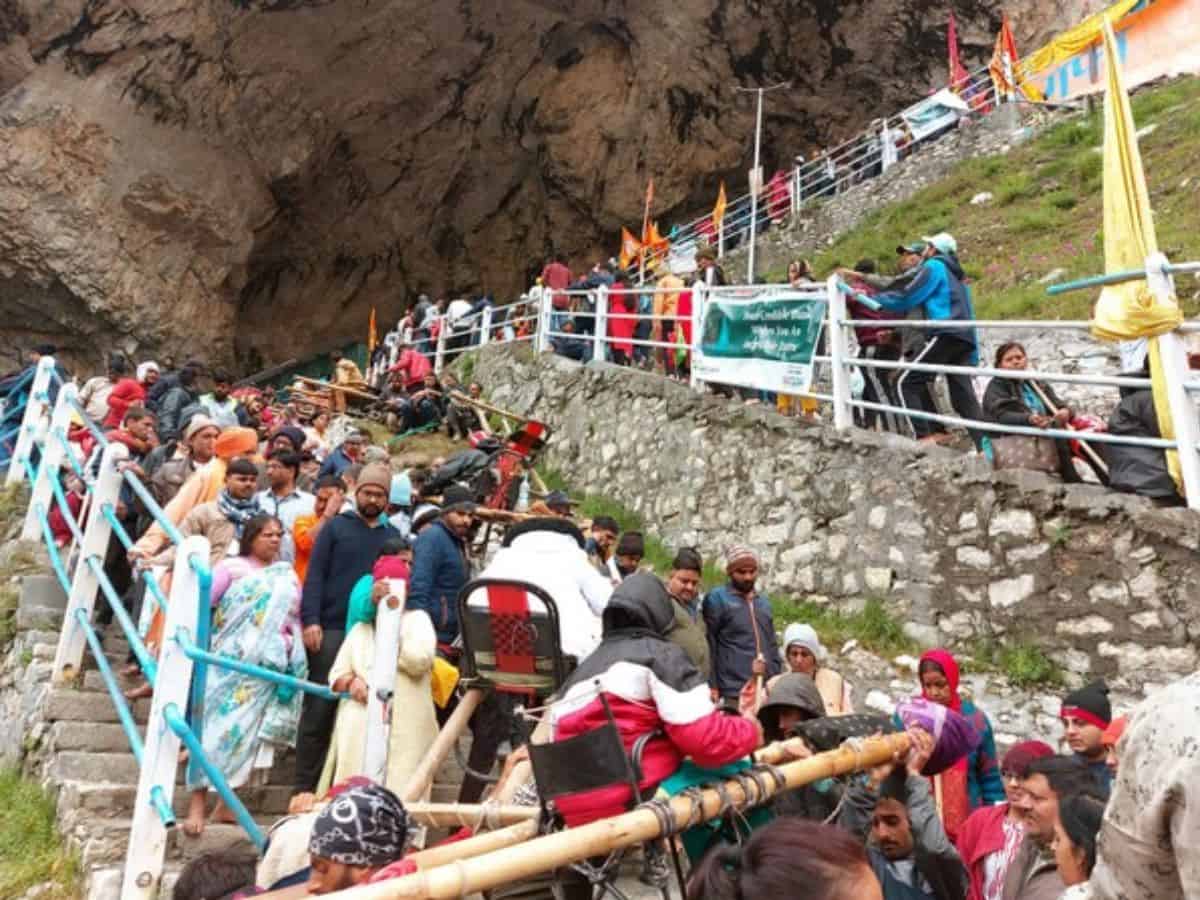
Kashmir’s top political leadership has stepped out with a reiteration of a very bold and beneficent message to the rest of the country and the world that they are bound by their traditions of respecting other religions and their pilgrimages even at the time when they and their land are at the receiving end of the politically and communally motivated narratives. “Amarnath pilgrims are welcome, and we are here to provide them all the hospitality and help to make their journey satisfactory, and successful.”
Two former chief ministers and prominent political leaders of Kashmir – National Conference president Farooq Abdullah and PDP president Mehbooba Mufti – gave a clarion call to their party workers and people at large to come out to help, facilitate and ensure that Amarnath pilgrimage is a success. This is an attempt to reinvoke the old traditions of Kashmir, when without any official patronage and arrangements, this more than 160-year-old annual pilgrimage to the cave shrine in Kashmir Himalayas, devoted to Lord Shiva, was people to people affair. It appears that the leadership is trying to tell the pilgrims and the nation that the people of Kashmir were waiting for them with open arms, and ready to do everything to make them comfortable during their journey of faith in high Himalayas.
Farooq Abdullah, who also is M P of Srinagar constituency visited Baltal base camp, reviewed the arrangements, particularly the health facilities set up for the pilgrims. He took minute details of the arrangements, which he appreciated and at the same time pointed out the deficiencies. He made it clear that the pilgrimage, better known as “ Amarnath Yatra” brings to Kashmir its revered guests from across the country, and they should be looked after by the people like they had been doing for ages.
Mehbooba Mufti called a meeting of leaders of her partymen from two districts – Anantnag and Ganderbal through which the pilgrims pass to trek to the cave shrine in Himalayas at the height of 13,500 feet above sea level and appealed to them to make themselves available to facilitate the pilgrims and help them in every manner possible. “ They are our guests and it is our tradition and duty to be perfect host to them. This is an obligation on us to live up to our rich traditions of communal co-existence and harmony.” And, she added, “ This is a golden opportunity for us to showcase the rich tradition and cultural ethos of the co-existence of Kashmiriyat to the world.”
The leadership is re-invoking the Hindu-Muslim co-existence tradition for which the Valley is known for centuries. The temples and mosques exist in close proximity to each other. They have been participants in each other’s festivals and also shared pain and distress together . Two objectives can be ascribed to this move, which may seem extraordinary in the given situation in the country wherein divide in communities is sharp and ever-widening. In fact, it has been the essence of the Kashmiri culture, which suffered a jolt in 1990s when the Kashmiri Hindus fled the Valley under the fear of persecution with the rise of militancy, roots of which lay in Islamic fundamentalism and Pakistani designs to rupture the communal harmony to further its agenda. It is to tell the country, and the Hindu pilgrims, in particular, that they are landing in safe place because the local Muslims are there to help and facilitate their journey to their holy place . Second, it is a message to the new generation of Kashmiris, who have not seen and experienced the bonhomie between the two communities, of which their elders were integral part.
These efforts, with a clear message to Hindu pilgrims who come in thousands every year – last year their number was estimated at 3.65 lakh, and this year the official estimate is that the yatra will cross the 9 lakh mark—show that the people of the Valley are waiting enthusiastically to welcome them and facilitate their religious journey. This message has come at a time when there are disturbing reports of lynching and other acts of communal discord are coming from some of the paces in the country, and added to that is the distorted picture of Kashmir to the people of the country. Kashmir, these leaders have reiterated continues to be at the core of communal harmony.
In a way, these leaders are sending a far wider and more effective message than the success of G 20 meet in Srinagar, in which Delhi made a geopolitical point of Kashmir being an integral part of the country to the international community, that for them their age-old traditions are bigger assets . . Kashmir’s political leadership was kept out of loop of the G 20 meet. Farooq Abdullah, who is a member of parliament from Srinagar, was not extended courtesy of even being told that the event is being organized in his constituency.
Political leadership have maintained that they would continue to hold on to their traditions and welcome the pilgrims, no matter what is said about them by the hostile elements against them. They have reiterated Kashmir’s picture in which pilgrims are honoured guests and local Muslims as perfect hosts.



